We’ve all been there: we’re eating out in a foreign country and the question arises: how much should I tip? Or, do I have to leave a tip at all? You have probably heard people say that you don’t tip in Italy. Well…that’s not exactly true.
Tipping customs around the globe are different and they depend on cultural as well as economic factors. In the U.S., for instance, tipped workers get a meager minimum income and the largest part of their salary comes from tips. So don’t think you can get away with a few cents! Tipping should be 15%-20% of the bill. In Far East Asia, on the other hand, the extreme opposite is true. Tipping waiters in Japan is considered very offensive, as providing exceptional service is part of their specific duties. Anything extra they receive is taken as being rude.
What is the tipping culture in Italy? Is tipping customary in Italy? When it comes to leaving a tip (la mancia) in Italy, the decision is mostly delegated to the customer, although there are non-written rules and common habits everyone should follow.
Even though tipping in Italy is not as widespread as it is in the United States, you might still see people tipping in cafes, restaurants, hotels and other specific situations. On top of this, the amount given is usually much lower.
In this guide, I’ll show you everything you need to know about tipping in Italy: when and where it is appropriate to tip, how much to leave, and how to do it properly. After all, not knowing what the local customs are can be stressful and you want to make sure your gesture does not come across as rude or offensive.
So… Iniziamo! (Let’s get started!)
To tip or not to tip? That is the question
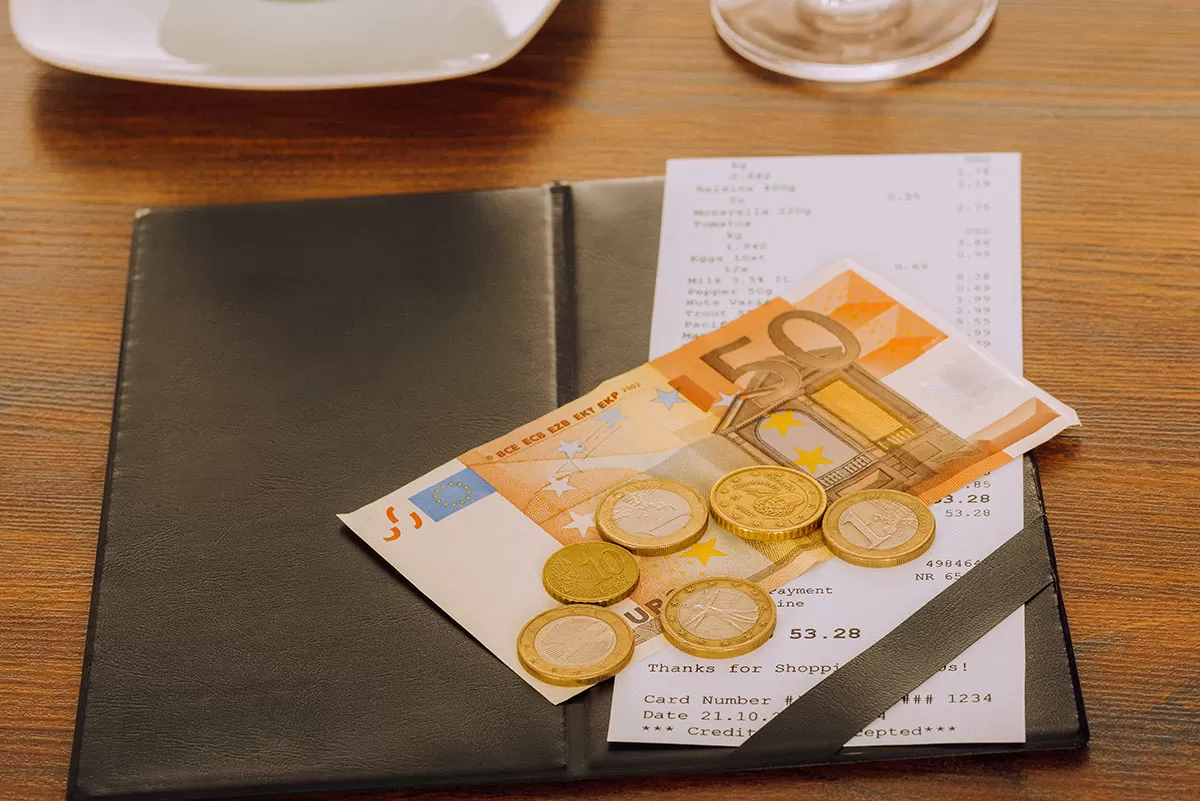 There’s quite a lot of confusion surrounding tipping in Italy and that is because tipping is not mandatory like it is in the U.S., for instance, but there are still a few expectations in certain situations. While it’s true that you don’t need to tip in Italy, it is also true that there’s a social etiquette you need to be aware of to avoid embarrassing situations.
There’s quite a lot of confusion surrounding tipping in Italy and that is because tipping is not mandatory like it is in the U.S., for instance, but there are still a few expectations in certain situations. While it’s true that you don’t need to tip in Italy, it is also true that there’s a social etiquette you need to be aware of to avoid embarrassing situations.
The first thing you need to know about tipping in Italy is that Italian workers, including staff in hospitality, are paid a monthly salary that more or less guarantees them fair compensation for their work. While receiving some extra money as a reward is highly appreciated, they don’t depend on tips to get by.
When you are at a restaurant in Italy, the prices you see on the menu already include tax and they show exactly how much you’re going to pay. Well, almost! One item you will very often find on your bill, in addition to food and drinks, is coperto. Coperto is a cover charge, which usually ranges from 1-3 euros per person, to offset the price of bread, oil, cutlery, tablecloths and anything else you might be using. Mind that this is not a tip! In Lazio, the region where Rome is located, coperto has been banned and it’s now illegal.
The national legislation requires coperto to be clearly indicated on the price list as well as the price of servizio. Servizio is another type of charge you might find on your bill and it’s basically a service charge in lieu of tips. You don’t leave a tip when servizio is included.
Overall, there are no strict rules about tipping in Italy and if you ask an Italian what they think about tipping, their answers may vary. One could say that there are three main schools of thought:
The first one is, no matter where you are, leaving an acknowledgement in form of gratuity to the staff for the service provided is a noble and kind gesture. Their effort must be rewarded, otherwise, you may pass for stingy and rude.
On the other hand, there are those who think that tipping is unnecessary, as the waiters are paid fairly for their work and you don’t need to give them a “bonus” for not spilling wine on you, as you don’t give extra money to the dentist for not drilling the healthy tooth, right?
Finally, the most common way to think in Italy is: the truth always lies in the middle. If your dinner was exquisite and you had exceptional service, then leaving a tip is a sort of ethical duty. But if, on the contrary, the staff were rude and the food unsatisfying, then tipping would lose its value as a gesture to acknowledge and reward good quality.
Ultimately, it is entirely up to you, and therefore, you will find local people tipping differently. Situations where you DO NOT leave a tip are:
- When you’re truly unhappy or unsatisfied with the service and/or the food;
- When you’re having a gelato or street food (but if you have food delivered at your place, then it is a kind gesture to leave a tip);
- When you grab something quick to eat at a café;
- In businesses where who is serving is the owner of the establishment;
- When you see “servizio incluso” (service included) on your bill, in that case, the tip has already been added to the final amount.
For all other situations, keep reading to find out more about the most common habits when it comes to tipping in Italy.
Tipping in Italy: Dos and don’ts
- Even when you’re paying the bill by card, tip with cash (adding your gratuity on the card machine is not always possible as the amount needs to match the one on the till). It is essential in Italy to always have some cash with you (see this and other Italy travel tips here).
- Remember that coperto is NOT a tip. If you wish to tip a particular server, make sure the money gets into their hands or they will never see it.
- When you want to pay, make sure you ask the waiter for the bill, otherwise, you’ll be waiting forever. They’re not ignoring you, it is just that in Italy it is considered rude for the waiter to bring you the bill without you asking for it. Learn some basic Italian phrases and how to ask for the bill here
- Don’t leave a handful of 1c or 2c euro coins, but instead opt for larger coins.
- Don’t show off by leaving big notes for small services.
- Don’t overdo it by leaving a lot of extra cash behind: leaving a few euros is fine but 20% of the total would be far too much.
How much to tip in common situations
Tipping in Italian restaurants
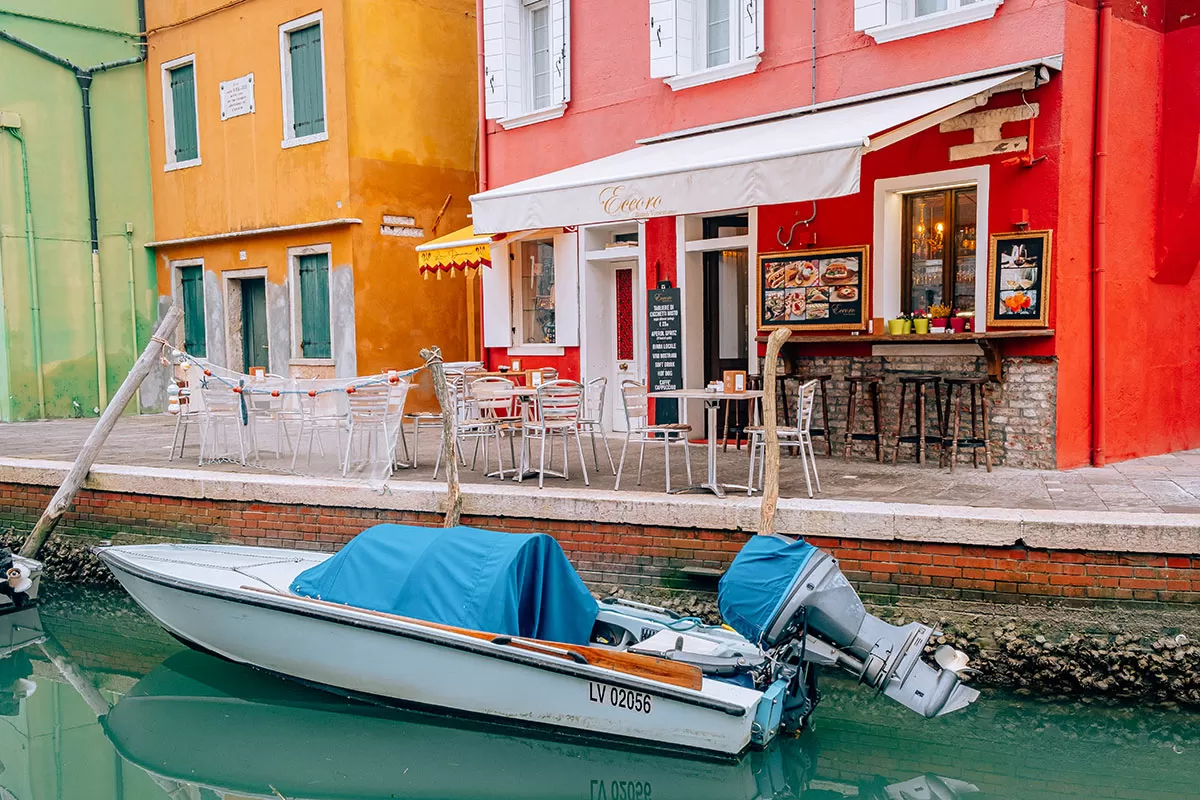 While it is still true that tipping in restaurants in Italy is not necessary, mass tourism in countries where tipping is the norm, like the U.S., has brought certain expectations and nowadays, compared to 20 years ago, the attitude of hospitality workers has changed.
While it is still true that tipping in restaurants in Italy is not necessary, mass tourism in countries where tipping is the norm, like the U.S., has brought certain expectations and nowadays, compared to 20 years ago, the attitude of hospitality workers has changed.
Nowadays in big cities and touristy places, like Rome, Florence or Venice, tipping when having a sit down breakfast, a small sit-down meal, an aperitivo with food or a restaurant dinner has become standard practice. If everything went well, the service was flawless and you’re happy with the food, it is normal and expected to leave something extra behind, whether it is a little sum for a cheap meal or a larger sum for a larger meal.
A good rule of thumb is leaving 1-2 euros for a smaller meal and rounding up to 10% of the bill total for a larger meal. More than that is considered far too generous. For example, if your restaurant bill is 46 euros, it would be common to leave 50 euros and just not ask for change.
But of course, if the whole experience was lousy then you should leave niente (nothing).
Tipping when ordering coffee in Italy
 For many people in Italy, having a coffee is a quick pit-stop in their day and that’s why Italians don’t even sit down but rather drink a quick espresso standing at the bar (“bar” in Italy is a café). If you want to follow this local habit and have your coffee standing up at the counter, you normally don’t have to tip.
For many people in Italy, having a coffee is a quick pit-stop in their day and that’s why Italians don’t even sit down but rather drink a quick espresso standing at the bar (“bar” in Italy is a café). If you want to follow this local habit and have your coffee standing up at the counter, you normally don’t have to tip.
In busy places, you generally pay for your coffee at the till first, then you get your receipt and with that, you go place your order. If the change amounts to 10 or 20 cents, you can use those coins as a tip, either by placing it on the counter with your receipt or by dropping it in the tip jar, if available. Even if you don’t do it, it’s perfectly fine: tipping for coffee in Italy is not expected nor standard.
Mind you that if you sit down for coffee, you may be charged a service fee for the servizio al tavolo (table service), especially in touristy areas. In this particular situation, tipping is not necessary.
Tipping tour guides
Taking part in a guided tour is often one of the best ways to see a place from a local’s eyes. Since Italy is so full of history, traditions and culture, having a tour guide for at least part of your stay is definitely a great idea. As for tipping your tour guide in Italy, there are two possible situations.
If you’re taking part in a paid tour, especially an expensive one, leaving a tip is usually not necessary, although a few euros to a nice guide is a kind gesture and a sign that you appreciated and are happy with the tour.
On the other hand, free walking tours often come with an expectation of a more generous gratuity; here, leaving a tip is common (and almost mandatory). Depending on your level of satisfaction with the service, you can leave whatever amount you feel appropriate, which is usually from 2-15 euros.
In both cases, the most common way to tip is by giving the guide cash at the end of the tour.
Tipping in Italian hotels
If you are staying in a full-service hotel, tipping is highly appreciated and recommended for longer stays, but not for short stays and in guesthouses and B&Bs.
To the porter who carried your bags you normally leave 1 euro per bag (and up to 5 euros) by handing him/her cash (when possible, slip them a note instead of dropping coins into their hand on the sly). If a server was particularly kind to you and made sure you were always taken care of, it is a nice gesture to leave him/her 1 euro per day of stay.
As for the housekeeping staff, it is common to give them 1 euro per day. The best way to tip in this case is by handing cash to the person directly at the end of your stay or via the reception desk.
Tipping taxi drivers in Italy
The general rule is that tipping a taxi driver in Italy is NOT done, especially if it’s a short trip. You usually pay for the taxi fare and get your change, or you may round up to 50 cents if it makes the change easier.
Having said that, however, it seems that it is becoming increasingly customary to leave a tip behind. You can give up to a couple of euros, particularly if the taxi driver was helpful with bags, or if he/she provided a smooth service by being kind and going out of their way to get somewhere fast and avoid traffic. In this case, the most common way to tip a taxi driver is by telling him/her to keep the change. The Italian phrase for that is “tenga pure il resto”. Learn the most essential Italian phrases here.
Final thoughts on tipping in Italy
The rumour that leaving a tip in Italy is insulting is absolutely not true: there’s no waiter or service employee who would ever tell you they’re offended for receiving a tip. As long as your gesture does not come across as being rude or condescending (based on what we’ve seen above), no one will judge you for how much you decide to tip (or for not tipping at all, if you don’t feel it is necessary). Ultimately, tipping in Italy should be about what you feel comfortable with.
I hope you found this guide on Italian tipping rules and customs useful. For more, don’t miss my guide to Italy travel tips that will save you time, money and disappointment. Buon viaggio! (Safe travels!)
Don’t miss my other Italy travel guides
- 19 Unique Experiences in Rome That Aren’t On Your List YET!
- Where to Stay in Rome | Best Hotels and Best Neighborhoods to Stay in Rome
- Top 7 Authentic Tours and Experiences in Rome [Run by Locals]
- Domus Aurea: Why You Should Visit Rome’s Secret Hidden Palace
- Rome Tips and Tricks: 27 Things You Should Know Before You Go to Rome
- Top 10 Absolute Best Views of Rome That Will Blow Your Mind
- Self-Guided Trastevere Walking Tour: Where to See Rome’s Most Beautiful Streets
- 26 Absolute Best Things to do in Verona, Italy
- Lakes, Mountains & Castles: 21 Best Things to do in Trento, Italy
- 21 Unique Things to Do in Venice You Should Try at Least Once
- 12 BEST Things to do in Burano, Italy (Tips from a Local Guide)
Planning a trip and need travel insurance? Get a free quote from World Nomads here.
Don’t be treated like a tourist. Learn Italian with my 80/20 method
Travelling to Italy? Don’t be treated like a tourist! Live your best travel experiences and learn Italian for less than the cost of eating at a tourist trap restaurant or a taxi driver who has “taken you for a ride”. I’ve made it easy for you to master the Italian language so you can create lifelong memories as you mingle with locals, get local tips, avoid tourist traps, and make new friends. Who knows, you may even be invited over for afternoon tea by a lovely Sicilian family like I was! Read all about how speaking Italian changed my life and check out my online Italian video course here.
Here’s what my students are saying:

I really enjoyed the Intrepid Italian course, it certainly exceeded my expectations. The learning methodology is great, and easy to follow and found that I progressed much faster in the last 4 weeks than I ever did on my own or using other language apps. Grazie mille Michele, I can’t wait until I can put my new skills into action! – Roma Small
Click here for instant access!
Like it? Pin it for later!
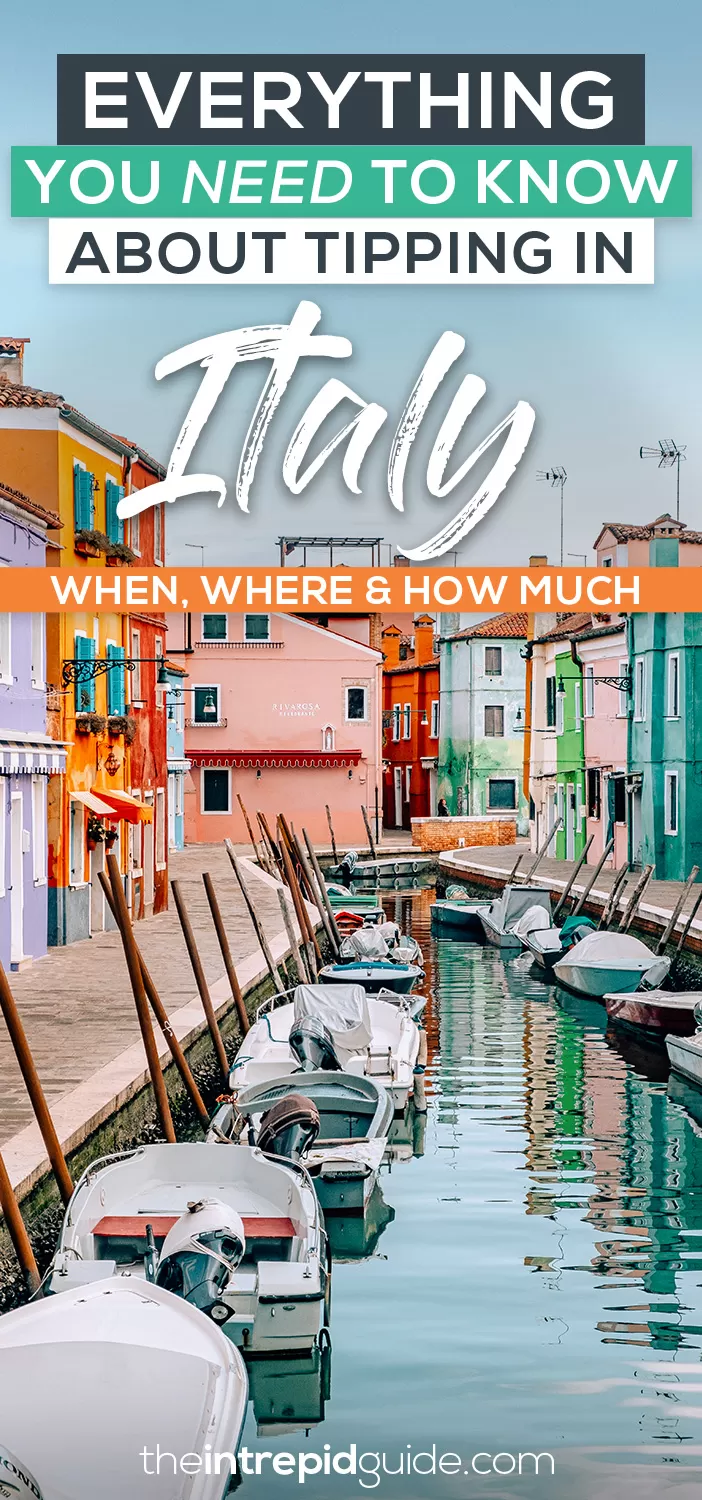
Over to you!
Did you enjoy this guide? Do you have any questions? Let me know using the comments section below or join me on social media to start a conversation.
Thanks for reading and I hope you enjoyed this post.
Like what you see? Subscribe using the form below to have all of my posts delivered directly to your email.


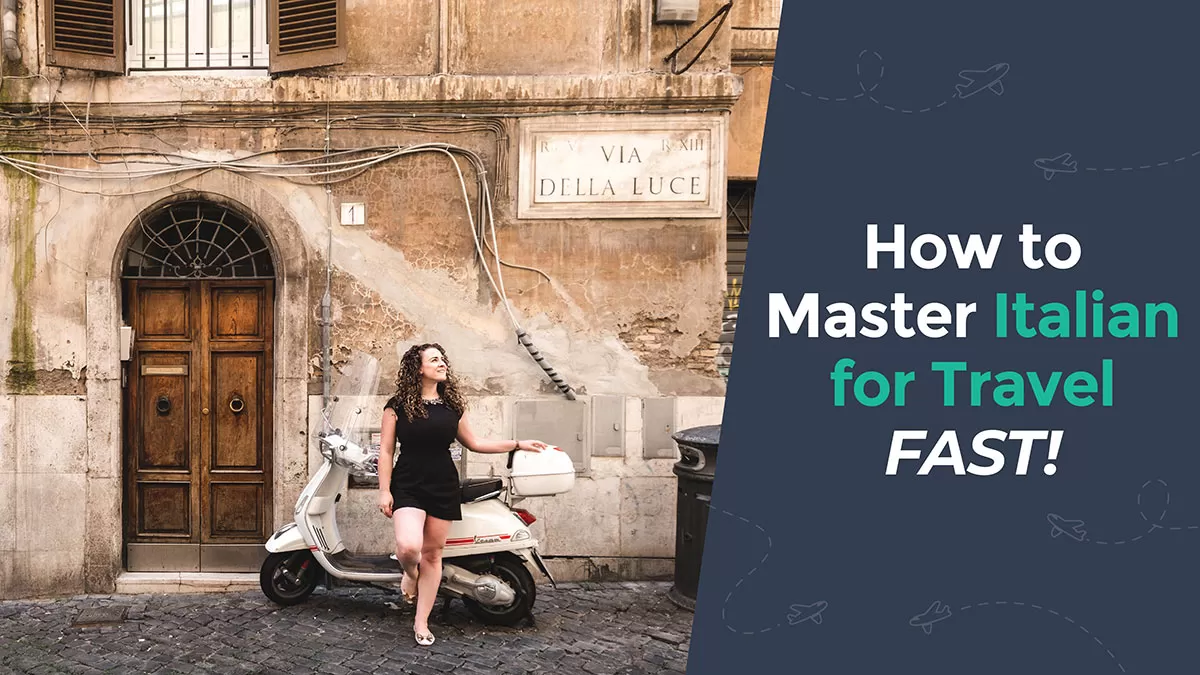
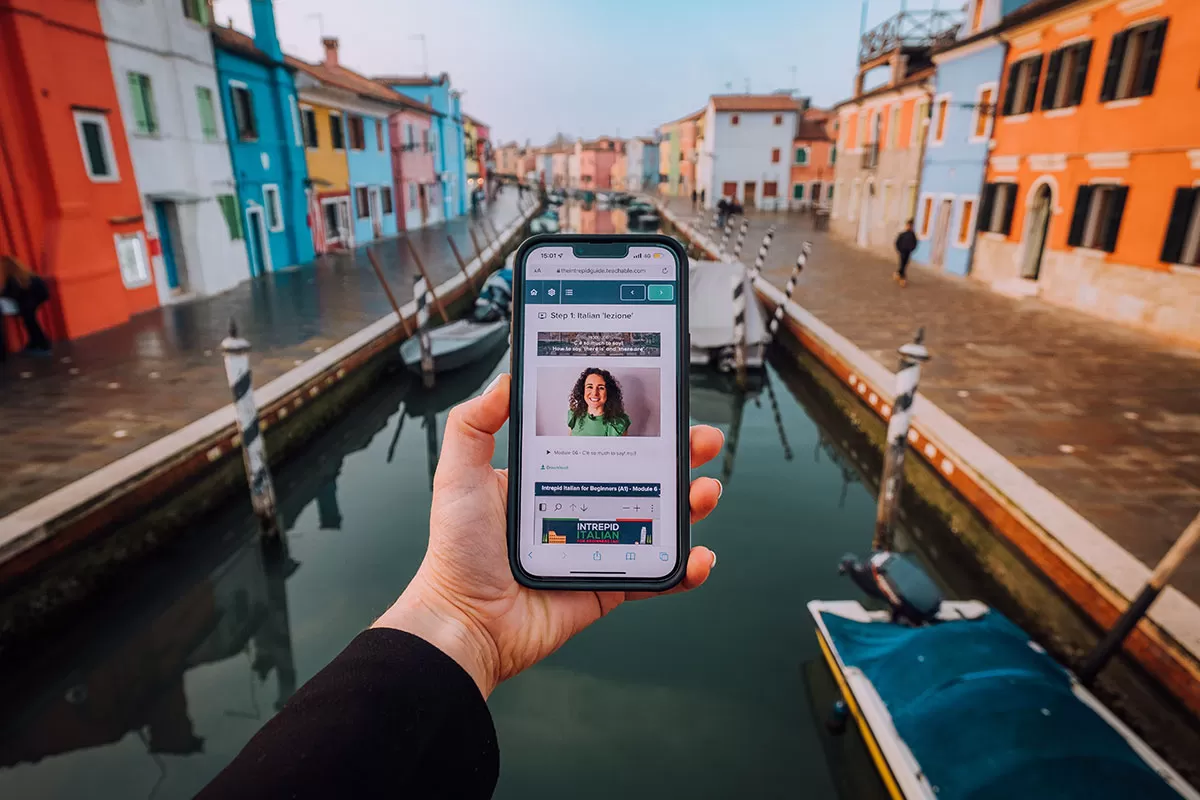
2 comments
Michele, I happened upon your website when searching for “tipping practices” — it is unbelievable! Your photos are brilliant, your links are amazing and your explanations are so clear & understandable! We are visiting Italy in September (next month – Venice, Tuscany, Amalfi Coast, Rome) and I want to read and reread everything you’ve written. In my opinion, your site and all of the information is BETTER than so many others because it is fresh, informative and speaks about the things I want to know and/or visit. Clearly this website was a long time in the making and your efforts have paid off. Well done…and I may come back with a question or two along the way. Super job!
Wow, Paul! Thank you so much for your kind words and support. It really does mean a lot :) Wishing you a wonderful trip to Italy :)